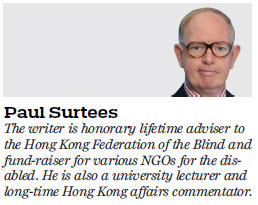Hong Kong can afford more support for differently abled citizens
Updated: 2017-06-26 07:26
By Paul Surtees(HK Edition)
|
|||||||||
As initiatives working toward a better and more inclusive Hong Kong are being considered by the Chief Executive-designate and her newly nominated cabinet members, they are urged to plan concrete steps to give our differently abled fellow citizens a better deal. Presently, and most regrettably, the disabled represent one of Hong Kong's most disadvantaged minority groups, both socially and economically.
It is truly humbling to reflect on the courage needed and displayed each and every day by those of us who must go through life blind or deaf, or with some other severe disability, or in a wheelchair. They are the unlucky ones in our society and those of us not so grievously afflicted can do well by them by taking steps to make their unenviable lives more pleasant.
Such steps can include simple actions by members of the able-bodied public, such as voluntarily vacating the special-needs seats on public transport to those boarding whose need may be greater. With increasing proportions of older people in the community, they and the disabled can be better catered-for by the provision of more special-needs seats on public transport.

Disabled people should not be stared-at by others, as that naturally makes them uncomfortable. One of the challenges is to make our disabled brothers and sisters feel accepted in the wider society, rather than feeling excluded by it like an outsider.
To be disabled in Hong Kong unfortunately means, for most of them, that there is very little likelihood that they would ever have a decent job commensurate with their potential abilities. Legislation should be introduced obliging bigger private employers to offer a certain proportion of positions as a priority to the differently abled.
Being unemployed of course generally means to live in poverty, in this wealthy city with its sky-high cost of living. A full disability pension - enough to live on - is clearly needed but yet to be provided. Hong Kong can well afford this enhanced level of financial support; the political will to provide it is what has so far been lacking.
In the long term, a program to train the disabled to take up a greater variety of jobs that matches their innate abilities and inclination is needed. It is in the larger interest of our community to see them become fully engaged economically and socially.
While they yet live, many older parents themselves take on the onerous care duties needed by their disabled sons and daughters. More trained stand-in caregivers are needed, supported from the public purse, to give these aging parents a break from time to time. Greater social provision, for the care of orphaned disabled people, is also needed: such as providing many more places at subsidized residential-care homes.
Those disabled people who are able to live fairly independent lives welcome the opportunity - which is too rare - to live in sheltered accommodation, where they can take care of themselves as much as possible but where expert staff help is available when needed. Much greater provision of such places is needed by the disabled, and also by Hong Kong's growing numbers of frail or permanently ill elderly citizens. The new administration could usefully make it a priority to build more sheltered accommodation.
Various sports organizations are providing opportunities to the disabled to enjoy individual sports - such as horse riding - and team games, right up to the Paralympic level. Additional government funding is needed to support such bodies as the Riding for the Disabled Association, the Sports Association for Persons with Intellectual Disability, and the Sports Association for the Physically Disabled to reach out to more participants.
Let us be reminded of the words of Mahatma Gandhi: "The true measure of any society can be found in how it treats its most vulnerable members."
(HK Edition 06/26/2017 page8)